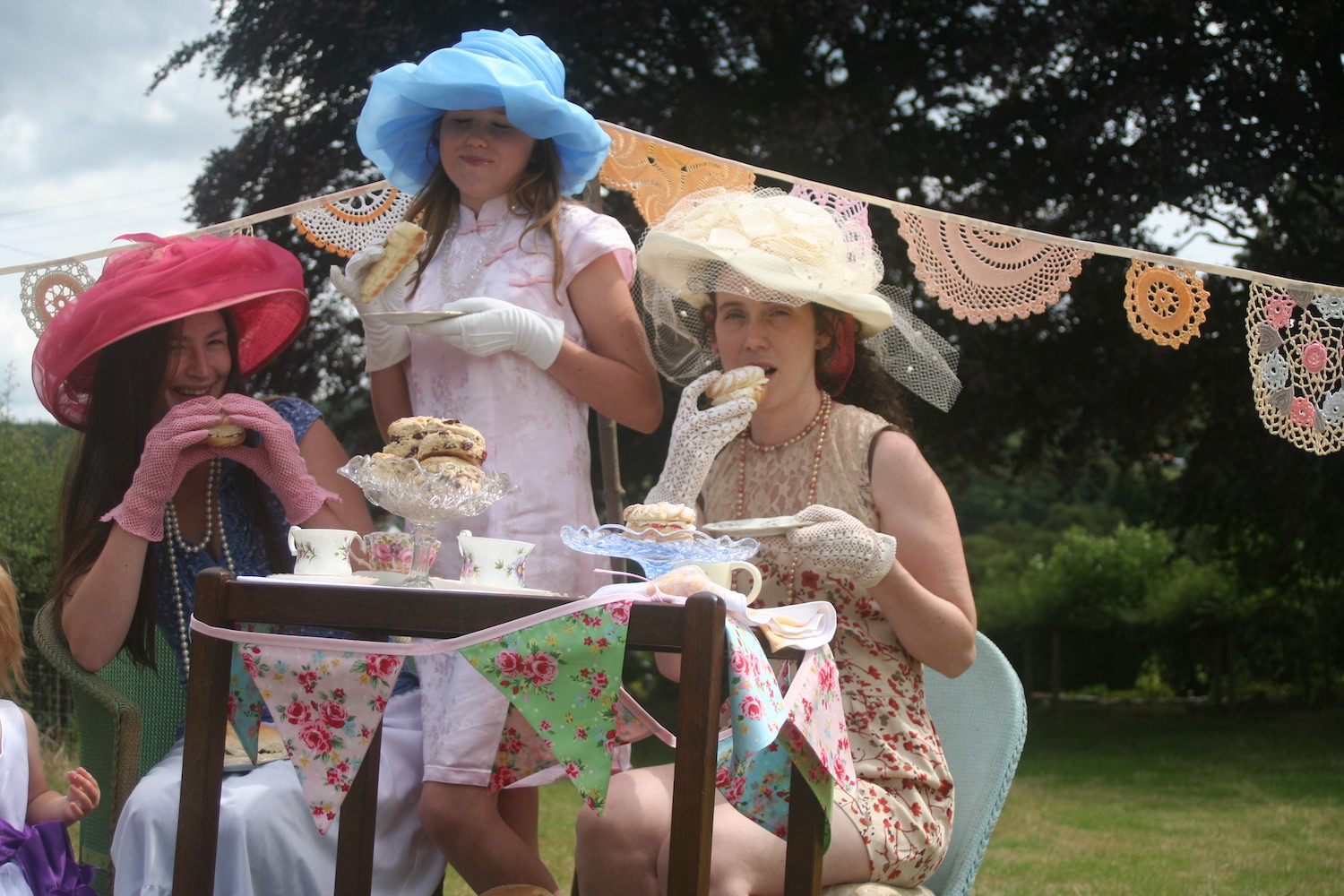Ah! The delights of afternoon tea with its dainty sandwiches, elegant cakes and the chink of good China cups are tough to top. Enjoyable any time of year, but especially at Easter, when spring has sprung and gardens are beginning to bloom.
There are few things more quintessentially British than the traditional afternoon tea, and it’s easy to understand why this graceful ritual is enjoying a comeback, for few can resist the temptations of perfectly decorated and decadent food arranged beautifully on an elegant three-tier cake stand.
Our food historian Seren Charrington-Hollins shares some tips on making yours extra special, and a recipe.

Make afternoon tea fun for all
A Brief History of Afternoon Tea
These days, afternoon tea is often seen as an indulgence, something reserved for special occasions or times when you want to allow yourself a special treat. However, this hasn’t always been the case, as the custom of afternoon tea was once an essential daily undertaking.
It came about during the Georgian period sometime from 1714 to 1830 and was initially nothing more than a small meal between breakfast and dinner. The story goes that the Duchess of Bedford, Anna Maria Russel, began a daily afternoon ritual of taking tea and a snack.
She lived during a time when it was common to eat only two main meals a day, with breakfast served early in the morning and dinner late in the evening. Struck by hunger pangs each afternoon (we can relate, Duchess) she used to complain of a ‘sinking feeling’ and so took a few nibbles, a private routine done surreptitiously in her bed chamber, but over time she began inviting friends to join her between 3 p.m. and 5 p.m. Eh voila, the tradition of afternoon tea was born.
Over the next few decades, the custom of afternoon tea became firmly established as a part of the British culture and enjoyed great popularity. As lifestyles became faster paced, however, its popularity declined and became the remit of those with more leisurely lifestyles.
Tea Time Today
Today afternoon tea is back in fashion and I for one am glad to see its return in popularity. Now special occasions are regularly celebrated by booking an afternoon tea and it is undoubtedly a good excuse for a social gathering that appeals across the generations.
“There are few hours in life more agreeable than the hour dedicated to the ceremony known as afternoon tea,” concurred the Victorian novelist Henry James in ‘The Portrait of a Lady’, a sentiment I whole heartedly share. I can think of nothing better than taking time over good tea, cake and sandwiches.
Indeed, afternoon tea is now all the rage in big cities like London and smaller towns too. Even traditional wedding breakfasts are pushed aside in favour of an afternoon tea. The next time you plan a gathering with friends, why not plan a tea party.
Now is a great time too, with Easter just around the corner and gardens popping with spring colour. Serve tea made with real leaves, brewed in a warmed pot and served in fine China cups. There is nothing quite like a morning spent baking and then a proper cuppa and a catch up with friends.
Make It Special
Putting effort into anything bears fruit, including taking time to dress the table. I suggest an heirloom, linen or lace tablecloth, embroidered table napkins or any pretty vintage shawls you may have to add a touch of panache.
Lay out pretty porcelain crockery and pick sweet-smelling posies from the garden, and pop them into a glass vase to turn any afternoon tea and into a special occasion.
I love making an Easter tree and it’s become known as a wishing tree in my family, because each member of our family places a tag on the tree with their special wish for the year, along with pretty decorations.
To make an Easter tree, collect some branches of shrubbery, and spray with matt cream aerosol paint, available from DIY and art shops. Place the base into a pretty old flower pot filled with sand and top up with pebbles. Hang with decorations like rabbits, hares, eggs or vintage style hand made crepe flowers.
Now all that remains to do is enjoy a pretty, satisfying and tasty spring afternoon tea that everyone will savour and remember.
Try this mouth-watering almond Pasque cake decorated with crystallised garden flowers.
Bon appétit!

Pasque Cake Recipe
Ingredients
Icing
100g icing sugar
½ juice lemon
Marzipan Filling
375g marzipan
85g caster sugar
1 whole egg
1 egg yolk
Cake
250g cubed salted butter
250g golden caster sugar
125g ground almonds
250g plain flour
½ tsp fine sea salt
2 tsp baking powder
2 drops of natural almond extract
Crystallised Flowers
Egg white
Caster sugar
Rose water
Instructions
First, crystallise your primroses and violets by painting the petals with a little egg white diluted with rosewater. Then sprinkle gently with caster sugar and leave to dry on a rack while you are baking your cake. I often crystalise these a day or two in advance.
Pre-heat the oven to 160C/315F. Make your marzipan filling by putting 375g marzipan, 85g caster sugar and a whole egg with an extra yolk into a food processor, gently pulse to a soft paste, and set aside. Mix 250g cubed butter and 250g golden caster sugar into a pale, soft cream. Add four eggs (free range) one at a time, alternating with 125g of ground almonds by the spoonful. Sift together 250g plain flour with half a teaspoon of salt and two teaspoons of baking powder and add to the mixture, stirring well. Add a drop or two of natural almond extract to taste.
Spread half of the cake mix into a 24cm springform tin lined with baking parchment. Spoon in the filling you made earlier and then add the rest of the cake mixture on top.
Bake for 30 minutes, then open the oven door gently and lay a piece of doubled folded, foil over the cake. Carry on cooking for a further 45 minutes. Your cake should now be golden brown and shrinking slightly from the sides. Leave on a cake rack to cool. Remove from the tin and store ready for icing.
For the icing
Mix 100g icing sugar with the juice of half a lemon and a little hot water to make a glaze. Pour over the top of the cake Allow to set for 5-10 minutes Decorate with your flowers and tie with a pretty ribbon.
For the marzipan
Forget the bright yellow paste of childhood with its bitter almond flavour. Home made marzipan is delicious and subtle in taste and colour. It’s simple to make too, and I love making marzipan eggs at Easter. It’s also a great activity for children.
Take equal amounts of caster sugar and ground almonds and bind them together with a beaten egg and teaspoon of orange flower water and a squeeze of lemon. Mix, then knead and roll out, using icing sugar to stop the paste sticking to your board. Using small moulds create Easter eggs, fruit or even rabbits. Always use small amounts of gel colour, not liquid food colourings for the best results.
Author bio: Seren Charrington-Hollins
Find more travel inspiration at BeSeeingYou









